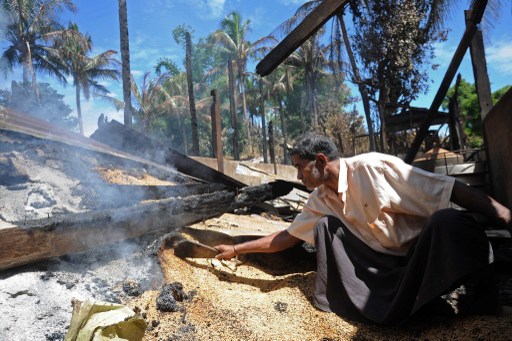The chairman of the Rakhine Nationalities Development Party (RNDP) in Sandoway township was detained for questioning by local police on Wednesday night in connection with the latest bout of Muslim-Buddhist violence to hit western Burma.
The party, which is known for its inflammatory anti-Muslim rhetoric, has previously been implicated in stirring communal tensions in the restive state, but always denied any involvement.
Five other people, including two members of a local nationalist group, known as the Organisation for the Protection of Race and Religion, were also detained, according to the RNDP secretary.
Khine Pray Soe, told DVB that police arrested Maung Pyu late on Wednesday evening, allegedly for fuelling this week’s violence between ethnic Arakan Buddhists and Kaman Muslims, which destroyed up to 70 homes and reportedly claimed five lives.
“He was picked up around 10:45pm by two policemen who said they had questions for him – but he was not told he was being arrested,” said Khine Pray Soe.
The RNDP secretary condemned Maung Pyu’s arrest as “out of order” and warned that the party was planning to take action if he was not released within 24 hours.
The arrest follows four days of vicious religious clashes in which Muslims appear to have borne the brunt. Many Muslims report being terrified of returning to their homes and say that police officers just stood idly by as mobs of Buddhists torched their homes. A 94-year-old Kaman woman was reportedly stabbed to death, while four other Muslims were killed.
Around 70 homes and two mosques were also burnt down, leaving over 1,000 people homeless.
Local sources in Sandoway said victims who lost their homes were taking shelter at friends’ houses, as there has been no tangible efforts by the authorities to provide them with humanitarian relief. Although schools were reopened in Sandoway on Thursday, the town remained quiet and uneasy, with many locals too afraid to go out.
[related]
A local political party representing Kaman Muslims accused the Buddhist authorities of siding with the Arakanese during the violence.
“Rule of law and tranquility in the region is crumbling due to incompetence and bias among regional authorities,” the Kaman National Progressive Party (KNPP) said in a statement on Wednesday.
Speaking to DVB on Thursday, KNPP secretary Tin Naing Win said it was the government’s responsibility to address the tide of anti-Muslim violence, which has spread through Burma since June 2012, displacing over 140,000 people and claiming at least 200 lives.
“It is the government’s responsibility to resolve the situation – I see that [violence] under the pretext of religion only arises as a result of the government’s lack of leadership and accountability,” he said.
Unlike the Rohingya, who are stateless and heavily persecuted in Burma, Kaman Muslims are among the 135 official ethnic nationalities recognised by the government. But over the past year, all Muslims in Buddhist-majority Burma have become the targets of a coordinated religious hate campaign led by the ultra-nationalist movement known as 969.
The RNDP has also been accused of targeting the Rohingya who they consider to be illegal Bengali immigrants. In December 2012, the party received a formal warning from the central government for describing Muslims in one of their newsletters as “animals” who disturb the community by making “noises like cows” when they pray.
President Thein Sein, who was on a scheduled visit to Arakan state this week, has also been accused of failing to quell the violence.
Four major Muslim groups published an open letter to Thein Sein on Tuesday, calling on him to take swift action to protect religious minorities. Both UN Secretary General Ban Ki-moon and the US embassy in Rangoon have issued statements condemning the unrest and urged ethnic reconciliation.
In a report published on Tuesday, the International Crisis Group (ICG) warned that religious violence could derail Burma’s fragile transition from military dictatorship to nominal democracy.
“At a moment of historic reform and opening, Myanmar [Burma] cannot afford to become hostage to intolerance and bigotry,” said Jim Della-Giacoma, ICG’s Asia programme director.



